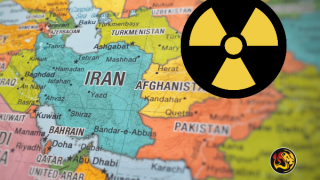
by Emmitt Barry, Worthy News Correspondent
(Worthy News) – Iran is surrounding two heavily buried tunnel complexes with a major security perimeter connected to one of its main nuclear facilities, according to a new report released Wednesday.
The Institute for Science and International Security cited recent satellite images in its report as the U.S. and Iran prepare for a third round of talks this weekend concerning Iran’s nuclear ambitions.
David Albright, president of the Institute for Science and International Security, said newly obtained satellite imagery reveals the construction of a large security perimeter around Mount Kolang Gaz La, located just south of Iran’s Natanz uranium enrichment complex. The development suggests that the tunnel complexes, which have been under construction for years, may soon become operational.
According to Albright, the depth of these tunnel facilities far exceeds that of Iran’s Fordow enrichment site near the holy city of Qom, making them significantly harder to detect or destroy in a potential military strike.
The institute’s report noted that the creation of a fortified perimeter around such deeply buried sites reflects Iran’s growing concern about possible attempts by individuals or groups to infiltrate the tunnel network undetected.
Satellite images dated late March show extensive grading and leveling across the mountainous terrain, aimed at establishing a secure boundary that connects the existing Natanz complex to the new tunnel site at Mount Kolang Gaz La. The scale and scope of the construction indicate Iran is accelerating efforts to shield and secure key elements of its nuclear infrastructure.
This week, U.S. and Iranian officials are scheduled to meet for a third round of negotiations focused on Iran’s advancing nuclear program—talks that come at a pivotal and highly sensitive moment. The diplomatic effort aims to de-escalate mounting tensions surrounding Tehran’s continued enrichment of uranium, which many fear is pushing the country dangerously close to weapons-grade capabilities.
Iran has consistently denied any intention of developing nuclear weapons, insisting its program is for peaceful, civilian purposes such as energy production and medical research. However, nuclear experts and Western officials remain deeply skeptical, pointing to Iran’s enrichment levels as cause for serious concern.
Civilian nuclear reactors typically require uranium enriched to only about 3–5%. Yet Iran has now begun enriching uranium to as high as 60% purity—just a short technical step away from the 90% threshold required for weapons-grade material.
Experts warn that there is no legitimate civilian justification for such high-level enrichment, and that it significantly shortens the so-called “breakout time”—the amount of time Iran would need to produce a nuclear bomb if it decided to do so. This latest round of talks is viewed by many as a last-ditch effort to reestablish constraints on Iran’s nuclear program, which were initially set in place under the 2015 nuclear deal that the U.S. exited in 2018.
With time running out and enrichment accelerating, the international community is watching closely to see whether diplomacy can deliver a breakthrough, or whether the failure to reach an agreement could set the stage for military confrontation.
Both U.S. President Donald Trump and Israeli Prime Minister Benjamin Netanyahu have made it clear that if diplomacy fails, military action remains a viable option. Trump has previously warned that unless a new agreement is reached to curb Iran’s nuclear ambitions, the United States is prepared to act decisively.
Netanyahu, echoing those sentiments, has long maintained that Israel will not allow Iran to obtain nuclear weapons under any circumstances and is willing to take unilateral action if necessary.
As the two allies closely monitor developments, this round of talks may represent one of the final opportunities to avoid a potential military confrontation with far-reaching consequences for the region and beyond.
Copyright 1999-2026 Worthy News. This article was originally published on Worthy News and was reproduced with permission.
Latest News from Worthy News
Official results confirmed Monday that Socialist Party candidate António José Seguro won Portugal’s presidential election with 66.7 percent of the vote, defeating André Ventura of the right-wing nationalist Chega (“Enough”) party.
Despite what advocates describe as decades of persecution, discrimination, and insecurity, Pakistan’s Christians remain steadfast in their faith and committed to peaceful coexistence, a leading Christian rights advocate said Friday.
Pakistani Christians on Friday condemned a suicide bombing during weekly prayers at a Shiite mosque on the outskirts of Islamabad that killed at least 31 people and injured 169 others in what officials described as the deadliest attack on Pakistan’s capital in more than a decade.
A single citizen tip ignited Operation Reclaim and Rebuild, a sweeping, week-long human trafficking operation that rescued nearly 20 children, uncovered residential brothels, and led to more than 600 arrests across California, authorities said this week.
Europe reeled Sunday after newly released U.S. Justice Department files detailing the late U.S. sex offender Jeffrey Epstein’s global contacts shook royal houses and governments, triggering resignations, investigations and political fallout across several European countries.
The Trump administration announced it will no longer abide by the expired New START nuclear arms agreement, arguing the treaty fails to restrain Russia’s expanding arsenal and excludes China’s rapidly growing nuclear forces, according to a senior State Department official.
Hungary’s main opposition leader is demanding answers over 650 billion forints ($2 billion) in disputed funds linked to foundation structures created by the Hungarian National Bank (MNB), branding the case “the world’s biggest bank robbery.”







